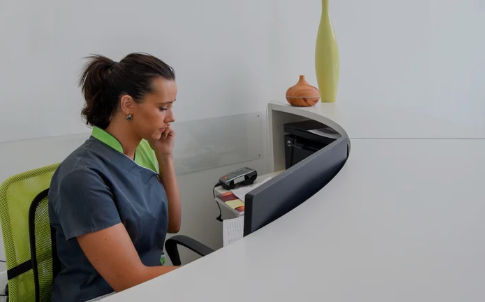
Patient Services Representatives (PSRs) play a crucial role in the healthcare system, serving as the front line of communication between patients and healthcare facilities. This guide explores the multifaceted responsibilities, necessary skills, educational background, and the overall landscape of the Patient Services Representative profession. From managing patient interactions and coordinating appointments to navigating medical records and addressing billing inquiries, this comprehensive guide delves into the intricacies of the PSR role.
1. Understanding the Role of a Patient Services Representative
a. Patient Interaction and Communication
At the heart of the role is patient interaction. Patient Services Representatives communicate with patients, families, and caregivers, providing information, scheduling appointments, and addressing inquiries.
b. Appointment Scheduling and Coordination
PSRs manage appointment schedules, ensuring efficient utilization of healthcare providers’ time and minimizing patient wait times.
c. Insurance Verification and Billing
Verification of patient insurance coverage and addressing billing inquiries are integral components of the PSR role. This involves coordinating with insurance providers to ensure accurate billing.
d. Medical Record Management
PSRs navigate electronic health records (EHRs) and other medical databases to retrieve patient information, update records, and ensure data accuracy.
2. Necessary Skills for Patient Services Representatives
a. Effective Communication
Clear and empathetic communication is crucial for building positive relationships with patients. PSRs should convey information in a manner that is easily understood.
b. Empathy and Compassion
Patients may be facing health challenges, and PSRs must approach interactions with empathy and compassion, addressing concerns and providing support.
c. Organizational Skills
Managing appointment schedules, coordinating with healthcare providers, and handling administrative tasks require strong organizational skills.
d. Problem-Solving Abilities
PSRs encounter various challenges, from addressing billing discrepancies to resolving scheduling conflicts. Strong problem-solving abilities are essential.
e. Multitasking
The ability to handle multiple tasks simultaneously, such as answering phone calls, managing appointments, and updating records, is vital for efficiency.
3. Educational Background for Patient Services Representatives
a. High School Diploma or Equivalent
While a high school diploma or equivalent is typically the minimum requirement, some healthcare facilities may prefer candidates with additional education.
b. Medical Office Assistant Certification
Obtaining certification as a Medical Office Assistant can enhance a PSR’s qualifications and provide a deeper understanding of medical office procedures.
c. On-the-Job Training
Many PSRs receive on-the-job training to familiarize themselves with specific healthcare facility protocols, software systems, and patient care procedures.
4. Patient Services Representative in Action
a. Appointment Scheduling
PSRs efficiently schedule and manage patient appointments, taking into account the availability of healthcare providers and the urgency of patient needs.
b. Insurance Verification
Verifying patient insurance coverage involves confirming eligibility, coverage limits, and understanding copayment or deductible requirements.
c. Handling Patient Inquiries
PSRs address patient inquiries regarding medical procedures, test results, billing concerns, and other aspects of their healthcare experience.
d. Coordinating with Healthcare Providers
Effective coordination with healthcare providers ensures that patients receive timely and appropriate care. PSRs act as liaisons between patients and medical staff.
5. Challenges in the Patient Services Representative Profession
a. Handling Difficult Interactions
PSRs may encounter challenging situations, including upset or frustrated patients. Managing these interactions with patience and professionalism is crucial.
b. Navigating Insurance Complexities
Understanding the intricacies of various insurance plans and navigating the complexities of billing and coding can be challenging for PSRs.
c. Maintaining Patient Privacy
Adhering to patient privacy regulations, such as the Health Insurance Portability and Accountability Act (HIPAA), requires diligence in handling sensitive information.
d. Balancing Workload
The role of a PSR can be fast-paced and demanding. Balancing multiple responsibilities and meeting patient needs promptly requires effective time management.
6. Career Advancement Opportunities for Patient Services Representatives
a. Specialization in Healthcare Fields
PSRs can explore specialization in specific healthcare fields, such as cardiology, orthopedics, or pediatrics, deepening their knowledge in a particular area.
b. Supervisory or Management Roles
With experience, PSRs may advance to supervisory or management positions, overseeing teams of patient services staff and contributing to process improvement.
c. Healthcare Administration Roles
Transitioning into healthcare administration roles allows PSRs to contribute to the strategic management of healthcare facilities and policies.
d. Advanced Degrees in Healthcare Management
Pursuing advanced degrees, such as a Master’s in Healthcare Administration, opens avenues for leadership roles in healthcare management.
7. Technology’s Impact on Patient Services Representatives
a. Electronic Health Records (EHRs)
The adoption of EHRs streamlines patient record management, allowing PSRs to access and update patient information more efficiently.
b. Telehealth and Virtual Platforms
The rise of telehealth and virtual healthcare platforms has influenced how PSRs schedule appointments and coordinate virtual visits for patients.
c. Patient Portals and Online Services
Patient portals provide an avenue for patients to access their medical records, schedule appointments, and communicate with healthcare providers, impacting PSR responsibilities.
d. Automated Appointment Reminders
Automated systems for appointment reminders enhance communication with patients, reducing no-show rates and improving overall appointment management.
Conclusion
Patient Services Representatives are essential contributors to the healthcare system, ensuring that patients receive efficient and compassionate care. The role requires a combination of interpersonal skills, organizational abilities, and a commitment to patient-centric communication.
By embracing challenges, staying informed about technological advancements, and seeking opportunities for career advancement, PSRs can play a vital role in enhancing the overall patient experience. As healthcare continues to evolve, Patient Services Representatives remain integral to the seamless coordination of patient care and the success of healthcare facilities in delivering quality services.







